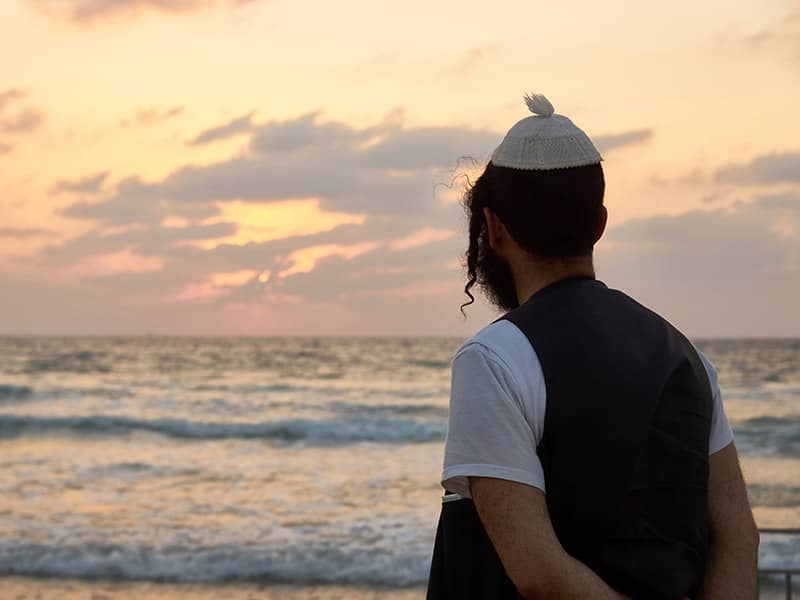Rabbi Irwin Kula is president of CLAL, the National Jewish Center for Learning and Leadership.
What are you looking forward to about the new year?
It struck me this year especially that new years are always about fresh starts and new beginnings, and it's very celebratory. In America we are very good at the celebration aspect. It seems to me that this is a very strange year to imagine that we will wake up January 1 and any of us are going to have a fresh start.
There's going to be a certain kind of depression on this new year's because we're going to wake up on January 1 and say nothing has changed at all. What we're in for this year is pretty frightening.
Is that different from how it was last year?
It's ratcheted up. Last year the intensity of what had just been 9/11 was still with us. Now, it's the reality. It was still shock last year. Now, we realize that not only is this not a fresh start, but we're in for a long haul of potential violence, war down the pipe this year, economic dislocation, more people out of work, additional people not with medical care. We're moving into a period in which there's no possibility that on January 1 we have a fresh start.
A number of things struck me. That's actually a quite depressing way to mark off a new year. With depression, you have a deep desire to blot out the memory of the past and to dull the sense in thinking about the past. America has always had in its civil ritual regarding new year's a high celebration of newness, because America is about newness.
What does Jewish tradition tell us about how to start a new year?
For so many centuries, Jews had an intuitive understanding that not much is changing next year. You were in exile, you were very vulnerable, you had no political power. What struck me was that Maimonides says whenever there is calamity or tragedy, whenever there is some major challenge to the security of either the individual or the Jewish people as a whole, the first thing you do is introspection. You don't examine the external. You examine the internal. I think what Maimonides is suggesting is that very often at a time when there is vulnerability, what you tend to do is hold on to your opinions for dear life. We're seeing in our society a deep polarization on a whole set of issues--a hardening about domestic issues, international issues. A hardening is exactly the opposite of what a fresh start is. A fresh start says it's possible to imagine that the categories are going to be redefined, that our thinking is going to be different.
It seems to me we're at a cul-de-sac on many issues, from an Israeli-Palestinian perspective, or an America-international perspective. There seems to be so many issues we are polarized on, and polarization is a reflection of a lot of fear. It may be important to wisdom traditions in general to contribute to this new year's celebration a certain kind of weightiness or sobriety in the midst of the party. Otherwise we're going to wake up and know exactly what we feel about things, exactly what we fear, and there's not a possibility for a fresh start, and 2003 will not in any way be new.
How can these ideas last beyond new year's day and into the year 2003?
If there's one resolution I would suggest people make now, it would be to read a book by a person I really disagree with. When we read with an open mind, our own thinking is affected. We begin to come to solutions from the synergies of the things we most deeply disagree with and our own views. Make a commitment to some kind of lecture, talk, or some place different, to hear or engage in conversation of some other. All of us know we don't have the whole truth. When people begin to believe they have the whole truth, that's when they begin killing each other.
I would really ask myself, "What am I missing from the other side?"
This is a long process. How else can people have more hope when they wake up on January 1?
I don't know if it's about hope as it is about making a commitment to start a process that creates newness and fresh thinking and undermines old habits of thinking. The hope comes from looking at the past a little more deeply, and finding in it lessons for the future. And the ultimate hope is that when I make a resolution this year, in the midst of tremendous polarization and a world almost at war, to go into the places where I most disagree to try to learn something, no matter how small, there's nothing more hopeful about human relationships than doing that. There's no greater symbol of despair than when I say I have nothing to learn from anybody on the other side of anything. The hope comes from the creation of new possibilities.
The place we're going to have to start first is our own thought patterns, consciousness, and engagement with other people. In Hebrew, that's t'shuva--a deep, internal introspection.

